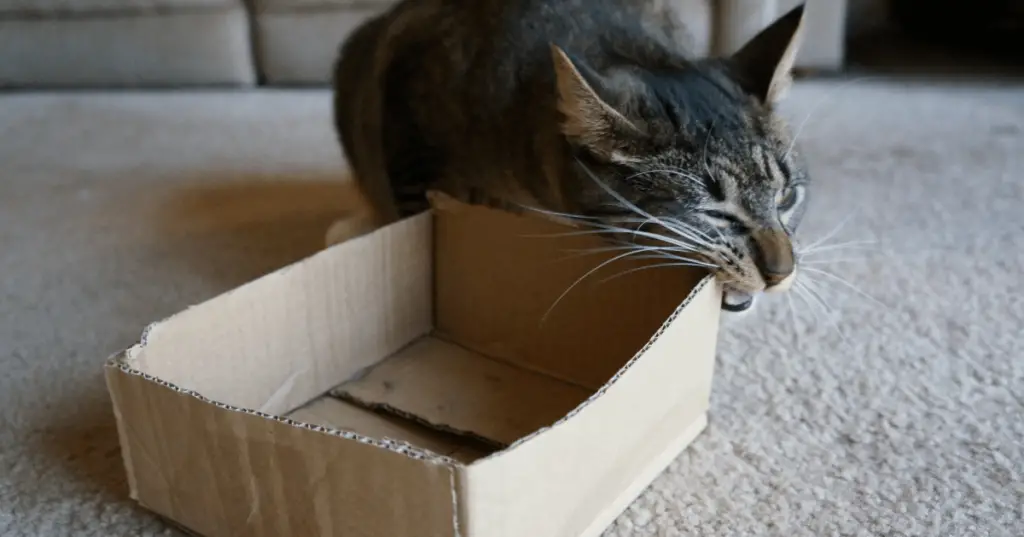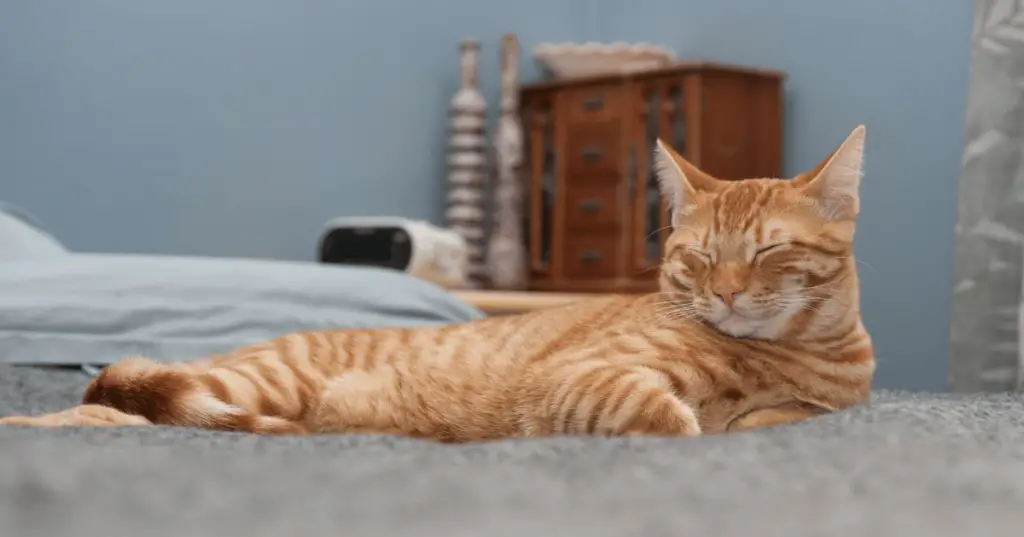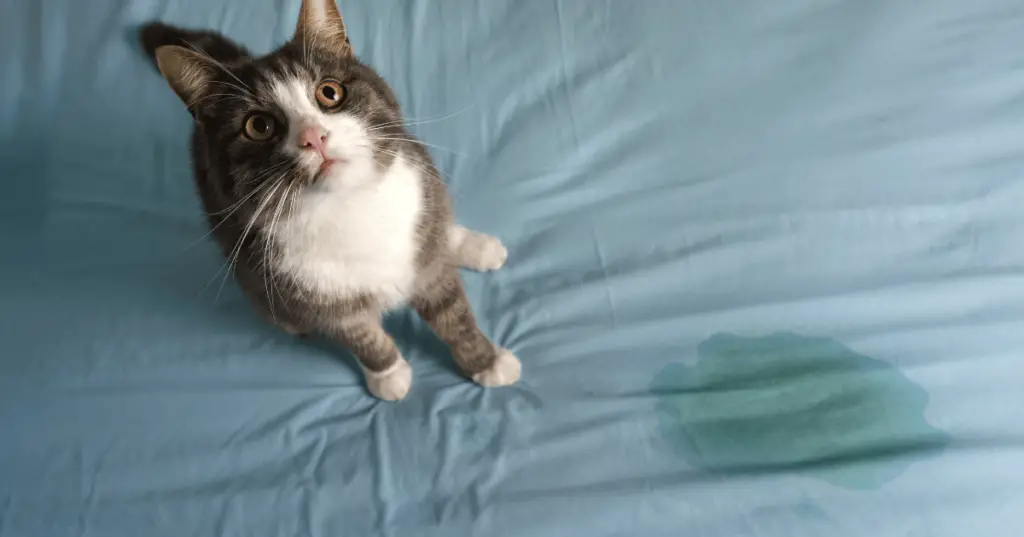Cats are fascinating creatures. One minute, they’re curled up on your lap, purring away, and the next, gnawing on a piece of cardboard from the recycling bin. But have you ever stopped to wonder: why do cats chew cardboard? It might seem like just another quirky behavior of our feline friends, but there are real reasons behind it.
Many cat owners search for answers to this curious behavior, wanting to ensure their pets are safe and happy. This article will delve into why cats have this unique attraction to cardboard. Whether you’re a seasoned cat owner or considering adopting your first furry friend, this guide will shed light on this peculiar habit and offer insights to better understand and care for your pet.
Is It Normal for Cats to Chew Cardboard?
Cats have a range of behaviors that seem odd to us. From chasing their tails to meowing at birds outside the window, they often leave us scratching our heads. Among these behaviors, many cat owners have noticed their pets nibbling or even chewing on cardboard. But is this normal?
Yes, it’s pretty common for cats to chew on cardboard. Many cats, both young and old, display this behavior. It doesn’t mean there’s something wrong with them or that they’re being naughty. We’ll explore various reasons, from health to simple fun, in this article.
However, while normal, continuous or excessive chewing might indicate underlying issues. Always watch your pet; if you have any concerns, visit a veterinarian. After all, our cats can’t tell us when something’s wrong, so it’s up to us to ensure they’re happy and healthy.
Reasons Why Does Cats Chew Cardboard
Cats are known for their playful and sometimes mysterious ways. One such puzzling behavior is their interest in cardboard. While it might seem strange to us, there are several reasons that explain why our feline friends are drawn to it. Let’s dive into these reasons to get a clearer picture.
1. Instinctual Behavior
Cats sometimes do things because of old habits. Before they lived with humans, cats were wild animals. They had to hunt for food. Tearing and chewing things was part of hunting. Now, when a cat chews cardboard, it’s like they’re remembering those old hunting days.
The cardboard is soft and easy to tear. So, for a cat, it feels like catching a small animal. Even if they live in a house now and don’t need to hunt, they still have those old habits. When your cat chews on cardboard, they’re just being a regular cat, doing what comes naturally.
2. Dental Health
cats also need a way to keep their teeth clean. Chewing on things can help with that. When a cat chews cardboard, it can help remove bits of food and other stuff stuck on their teeth. It’s like using a toothbrush but for cats.
Cardboard is rough and can act like a scrubber for their teeth. This doesn’t mean cardboard replaces proper dental care, but it can be a helpful addition. Still, if you notice your cat chewing a lot, it’s good to check with a vet to ensure their teeth are okay. Sometimes cats chew cardboard to help clean their teeth.
3. Stress and Anxiety Relief
Cats can feel stressed or anxious, just like people do. Changes in the house, new people, or even loud noises can make a cat uneasy. Feeling this way, they might look for things to help them relax.
Chewing on cardboard can be one of those things. It can be like how some people squeeze a stress ball when nervous. The chewing gives them something to focus on and can help them feel calmer.
So, if your cat suddenly starts chewing cardboard more than usual, it might be because they’re stressed. It’s always a good idea to see if anything has changed in their environment and to give them extra love and attention.
4. Boredom and Entertainment
Cats are playful animals, always looking for things to engage with. Without enough toys or activities, they can become bored. The cardboard provides an interesting texture and sound for cats.
Chewing and tearing at cardboard can be a source of entertainment for them. It’s crunchy, makes interesting noises when bitten, and can be shredded, offering them a way to stay active and entertained.
5. Teething Kittens
When kittens grow, they get new teeth, just like human babies. This process can be uncomfortable for them. Their gums might be sore or itchy as new teeth come in. Chewing on things can help soothe these feelings.
Cardboard is soft enough not to hurt a kitten’s teeth but firm enough to relieve their sore gums. That’s why young cats are especially drawn to chewing cardboard pieces.
6. Dietary Deficiencies
Sometimes, what a cat eats (or doesn’t eat) can affect their behavior. A cat may start chewing on odd objects, such as cardboard if it isn’t getting all the nutrients it needs from its meal.
For instance, if a cat lacks certain minerals in its diet, it might be attracted to substances that seem like a source of those minerals. While cardboard isn’t a good source of nutrition, exploring a cat’s senses is an option.
It’s important to make sure our cats have a balanced diet. If a cat chews cardboard without a clear reason, it might be good to check their food. Visiting a vet to ensure everything’s okay could also be wise.
How Do You Make Your Cat Stop Chewing Cardboard?
While it’s natural for cats to be attracted to cardboard, too much chewing can be a concern. Eating large amounts might cause stomach issues or lead to other problems.
Here are some tips you can do to help your cat move away from this habit:
Provide Cat-Friendly Toys: Offer toys that are made especially for cats. These toys might amuse them and satiate their chewing urge.
Use Catnip: Some cats love catnip. It can divert their attention away from cardboard. Try sprinkling some on their toys.
Keep Cardboard Out of Reach: If you notice your cat chewing too much cardboard, store it in places they can’t reach.
Check Their Diet: As mentioned before, ensure your cat is getting a balanced diet. Sometimes, dietary changes can reduce their urge to chew.
Give Them Attention: Play with your cat regularly. Sometimes, they chew out of boredom; spending time with them can help reduce that.
Consult a Vet: If your cat’s cardboard chewing seems excessive or you’re worried about their health, always check with a vet. They can offer more insights and solutions.
Conclusion
Cats have their unique ways that make them both intriguing and endearing. Chewing cardboard is just one of those behaviors. While it might seem unusual initially, there are clear reasons behind it, from instincts to health concerns.
By understanding these reasons and taking simple steps, we can ensure our furry friends are happy and safe. Always monitor any behavior changes and consult with professionals when in doubt. After all, our feline companions rely on us for their well-being.




Pingback: 5 Reasons Why Do Cats Twitch Their Backs - buildlux2
Thank you for your sharing. I am worried that I lack creative ideas. It is your article that makes me full of hope. Thank you. But, I have a question, can you help me?
Please let me knwo your question. I’m happy to answer you (:
Hey people!!!!!
Good mood and good luck to everyone!!!!!
Si te apasiona los sitios de apuestas en linea en Espana, has llegado al lugar indicado.
En este sitio encontraras analisis completos sobre los mejores casinos disponibles en Espana.
### Ventajas de jugar en casinos de Espana
– **Licencias oficiales** para jugar con seguridad garantizada.
– **Ofertas para nuevos jugadores** que aumentan tus posibilidades de ganar.
– **Amplia variedad de juegos** con premios atractivos.
– **Transacciones confiables** con multiples metodos de pago, incluyendo tarjetas, PayPal y criptomonedas.
Ranking de los mejores operadores en Espana
En este portal hemos recopilado las **resenas mas completas** sobre los casinos con mejor reputacion en Espana. Consulta la informacion aqui: casinotorero.info.
**Abre tu cuenta en un casino confiable y descubre una experiencia de juego unica.**
Your comment is awaiting moderation.